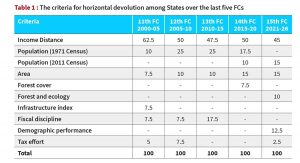Syllabus: GS-II
Subject: Polity
Topic: Federalism ,
Issue: Financial relation
Southern state have raised issue of not receiving proper share in financial devolution:
- Divisible pool of taxes are defined in article 270 of constitution divided as per recommendation of Finance Commission(Article 280)

· Income distance’ is the distance of a State’s income from the State with highest per capita income which is Haryana.
· ‘Population’ is the population as per the 2011 Census.(from 15th FC)
· ‘Forest and ecology’ consider the share of dense forest of each State in the aggregate dense forest of all the States.
· ‘The demographic performance’ criterion has been introduced to reward efforts made by States in controlling their population.
· ‘Tax effort’ as a criterion has been used to reward States with higher tax collection efficiency.
